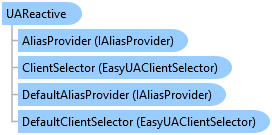

OPC Studio User's Guide and Reference
UAReactive Class


'Declaration<ComVisibleAttribute(False)> <TypeConverterAttribute(System.ComponentModel.ExpandableObjectConverter)> <CLSCompliantAttribute(True)> <ValueControlAttribute("OpcLabs.BaseLib.Forms.Common.ObjectSerializationControl, OpcLabs.BaseLibForms, Version=5.82.174.1, Culture=neutral, PublicKeyToken=6faddca41dacb409", DefaultReadWrite=False, Export=True, PageId=10001)> <SerializableAttribute()> Public Class UAReactive Inherits OpcLabs.BaseLib.Info Implements LINQPad.ICustomMemberProvider, OpcLabs.BaseLib.ComTypes._Info, OpcLabs.BaseLib.ComTypes._Object2, System.ICloneable, System.Runtime.Serialization.ISerializable, System.Xml.Serialization.IXmlSerializable
'UsageDim instance As UAReactive
[ComVisible(false)] [TypeConverter(System.ComponentModel.ExpandableObjectConverter)] [CLSCompliant(true)] [ValueControl("OpcLabs.BaseLib.Forms.Common.ObjectSerializationControl, OpcLabs.BaseLibForms, Version=5.82.174.1, Culture=neutral, PublicKeyToken=6faddca41dacb409", DefaultReadWrite=false, Export=true, PageId=10001)] [Serializable()] public class UAReactive : OpcLabs.BaseLib.Info, LINQPad.ICustomMemberProvider, OpcLabs.BaseLib.ComTypes._Info, OpcLabs.BaseLib.ComTypes._Object2, System.ICloneable, System.Runtime.Serialization.ISerializable, System.Xml.Serialization.IXmlSerializable
[ComVisible(false)] [TypeConverter(System.ComponentModel.ExpandableObjectConverter)] [CLSCompliant(true)] [ValueControl("OpcLabs.BaseLib.Forms.Common.ObjectSerializationControl, OpcLabs.BaseLibForms, Version=5.82.174.1, Culture=neutral, PublicKeyToken=6faddca41dacb409", DefaultReadWrite=false, Export=true, PageId=10001)] [Serializable()] public ref class UAReactive : public OpcLabs.BaseLib.Info, LINQPad.ICustomMemberProvider, OpcLabs.BaseLib.ComTypes._Info, OpcLabs.BaseLib.ComTypes._Object2, System.ICloneable, System.Runtime.Serialization.ISerializable, System.Xml.Serialization.IXmlSerializable
Microsoft Reactive Extensions (Rx) and reactive programming in general is a big subject and cannot be covered in any detail here. We will only describe the specifics that OPC Data Client brings to Rx, by bridging it with the world of OPC.
The power of reactive extensions is in their high level of abstraction, asynchronous nature, and ability of composition.
Microsoft provides Reactive Extensions (Rx) as a NuGet package. Reference the corresponding package in your project, in order to get access to the Rx types. In Visual Studio, use the “Tools -> Library Package Manager” command, and search for “Reactive Extensions – Main Library”, as on the following picture.
System.Object
OpcLabs.BaseLib.Object2
OpcLabs.BaseLib.Info
OpcLabs.EasyOpc.UA.Reactive.UAReactive
OpcLabs.EasyOpc.UA.Reactive.UADataChangeNotificationObservable<TValue>
OpcLabs.EasyOpc.UA.Reactive.UAWriteValueObserver<TValue>